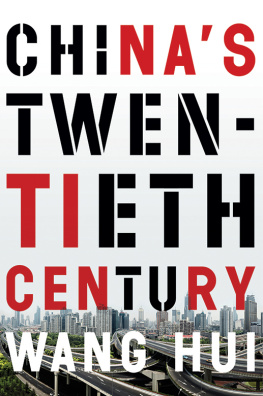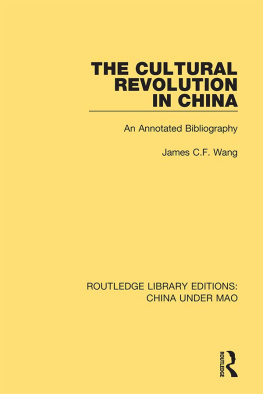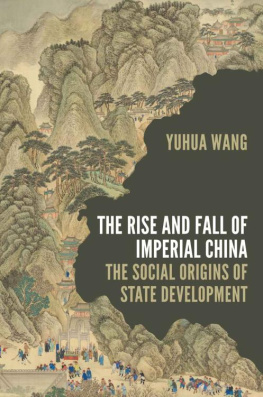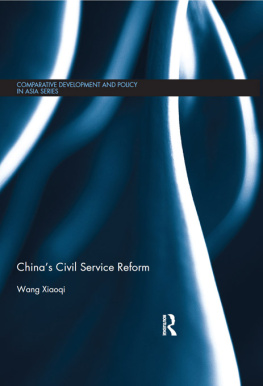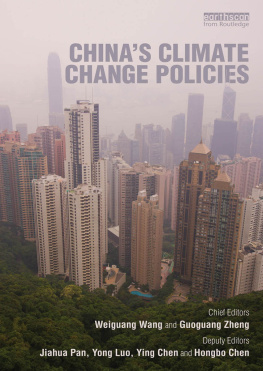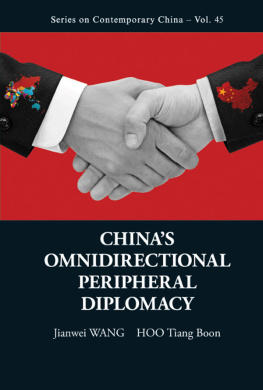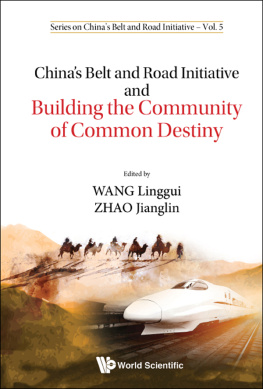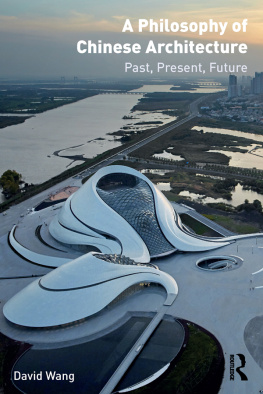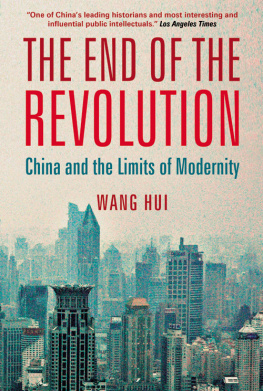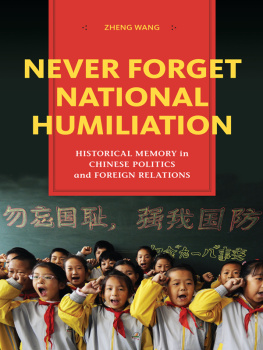CHINAS TWENTIETH
CENTURY
Revolution, Retreat and the Road to Equality

WANG HUI
Edited by Saul Thomas

First published by Verso 2016
Introduction translation Saul Thomas 2016
Chapter 1 translation Chen Xiangjing 2016
Chapter 2 translation Anne Chao 2016. An earlier version of this chapter was previously published in English as The Transformation of Culture and Politics: War, Revolution, and the Thought Warfare of the 1910s, Twentieth-Century China 38, no. 1 (January 2013)
Chapter 3 translation Gao Jin 2016
Chapter 4 translation Gao Jin and Yin Zhiguang 2016; an earlier version of this chapter was previously published in English as The Crisis of Representativeness and Post-Party Politics, Modern China 40, no. 2 (March 1, 2014)
Chapters 5 translation Saul Thomas 2016
Chapters 6 and 7 translation Lewis Hinchman and Christopher Connery 2016
Appendix translation Yan Hairong and Saul Thomas 2016
All rights reserved
The moral rights of the author have been asserted
1 3 5 7 9 10 8 6 4 2
Verso
UK: 6 Meard Street, London W1F 0EG
US: 20 Jay Street, Suite 1010, Brooklyn, NY 11201
versobooks.com
Verso is the imprint of New Left Books
ISBN-13: 978-1-78168-906-6 (PB)
ISBN-13: 978-1-78168-905-9 (HB)
eISBN-13: 978-1-78168-908-0 (US)
eISBN-13: 978-1-78168-907-3 (UK)
British Library Cataloguing in Publication Data
A catalogue record for this book is available from the British Library
Library of Congress Cataloging-in-Publication Data
Names: Wang, Hui, 1959 author. | Thomas, Saul, editor.
Title: Chinas twentieth century : revolution, retreat, and the road to equality / Wang Hui ; edited by Saul Thomas.
Description: Brooklyn, NY : Verso Books, 2016. | Includes bibliographical references and index.
Identifiers: LCCN 2015030497 | ISBN 9781781689066 (alk. paper)
Subjects: LCSH: ChinaPolitics and government20th century. | ChinaHistory20th century.
Classification: LCC DS775.7 .W33713 2016 | DDC 951.05dc23 LC record available at http://lccn.loc.gov/2015030497
Typeset in Fournier by Hewer Text UK Ltd, Edinburgh, Scotland
Printed in the US by Maple Press
Contents
In 1907, well before the 1911 revolutionary process was underway, the twenty-six-year-old Lu Xun, using an obscure and antiquated style of classical Chinese, expressed his expectations for the newly arrived century thusly:
This writer would venture the opinion that [since] cultures tend to gain perspective as they develop and the human mind is never at ease with a static and unchanging state of affairs, the civilizations of the twentieth century will most assuredly be characterized by depth and dignity and their proclivities will diverge markedly from those of the nineteenth. Will not the advent of a new life put an end to hypocrisy and cause the inner life to gain in profundity as well as in strength? Will not the radiance of spiritual life come to flourish and thrive? Cannot an awakening from the illusory world of objectivity enhance the growth of a life of subjectivity and self-awareness? If the inner-life is strengthened, the significance of human existence will consequently be deepened and the value of the integrity of the individual become more clear; then a new spirit may indeed inform the twentieth centuryone which can enable it to withstand the rages of wind and sea, and rely upon the strength of the human will to carve out a new path for a different mode of existence.
Lu Xun used two phrases to summarize what he called the new spirit of the twentieth century: cut away the material and expand the spirit, and rely on the individual and reject sheer numbers.
This is one of the earliest pronouncements on the twentieth century that can be found in China. To contemporary Chinese people, the concept of the twentieth century was an alien thing (yiwu) which had seemingly appeared out of nowherefor before this, China had not known a nineteenth century or eighteenth century. This was at a time when 1907 was known as the dingmo year of Guangxu, that is, the thirty-third year of the reign of the Qing emperor Guangxu, the ninth emperor since the Manchus had come down from the north. In Lu Xuns essay, the the nineteenth century set against the twentieth century did not point to Chinas past, but to the historical period initiated by the revolutions in France and England. For Lu Xun, however, we in China could only achieve self-awareness if we took this alien element of the twentieth century as our mission. Why was this the case? Because the dual revolution of the nineteenth century had been the old goal established by the tide of reform and revolution in the late Qing period. Beginning in 1860, under the shadow of the defeats suffered in the First and Second Opium Wars, China began a Westernization Movement (yangwu yundong) aimed at enriching the country and strengthening its military. After Chinas loss in the first Sino-Japanese War (189495), this movement to study the advanced techniques of the barbarians to control the barbarians morphed into a political reform movement exemplified by the Hundred Days Reform of 1898, one of the key aspects of which was an attempt to imitate European constitutional politics, establish a parliament and change the dynastic kingdom into a modern state. The failure of this movement to reform the government marked the arrival of the era of national revolution. In the raging tide of revolution, the republic gradually rose on the horizon. The forces driving the birth of this new China were the arrival of Europes nationalism, market economics, material civilization and political systems. Because of this, even though China did not have a nineteenth century in the same sense as Western Europe or Russia, the twentieth century became the way for China to achieve its mission of moving beyond the late Qing goal of reform and revolution, and became its opportunity to achieve self-awakening.
In a sense, the concept of the twentieth century was not merely one alien thing, but many. The promoter of constitutional monarchy Kang Youwei wrote Datong shu (The great unity) during this period, a work whose concepts and visiongenerated from an amalgam of Confucian, Buddhist and utopian communist ideasnot only surpassed the constitutional monarchy he himself supported, but transcended the entire content of the nineteenth century. The radical nationalist revolutionary Zhang Taiyan used a theory of the equality of all things to make sharp criticisms of nineteenth-century statism, racism, party politics, constitutional democracy and formal democracy, and as such, Zhang became an internal alien thing within the revolutionary movement. Even the leader of the 1911 Revolution, Sun Yat-sen, attempted to combine two different and opposed revolutionsthe nineteenth-century revolutionary nationalist movement to increase the wealth and power of the state, and the twentieth-century social revolutioninto a single revolution. If state sovereignty, national identity, party politics, civil society, industrial revolution, urbanization, state planning, market economics, and the corresponding educational system and media culture together constituted the main content of Chinas social transformation during this period, then the truly alien elements of the twentieth century remained latent within it. To put it another way, while most of the content of Chinas twentieth-century transformation were extensions of or derived from the long nineteenth century, latent within these transformations were their opposites or negation. To reiterate Lu Xun, a new spirit may indeed inform the twentieth century, one which can enable it to withstand the rages of wind and sea, and rely upon the strength of the human will to carve out a new path for a different mode of existence. Will expresses a sort of conscious activity, a power that can transcend objective conditions and carry out creative action. This type of creative power is not simply subjectivity, but rather a product of bringing the goal of a particular struggle into a broader framework.

